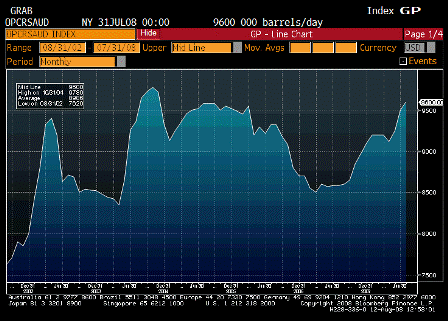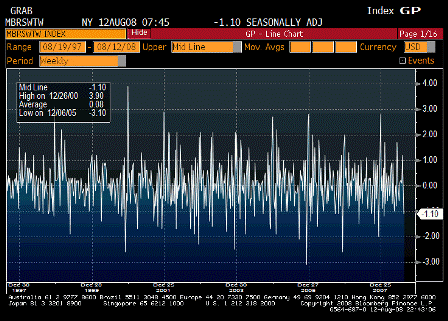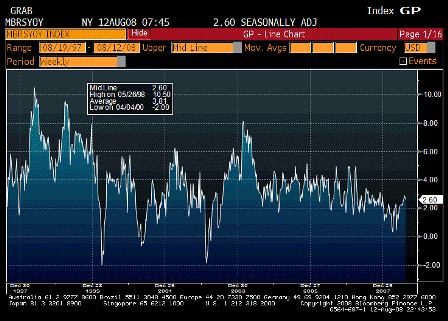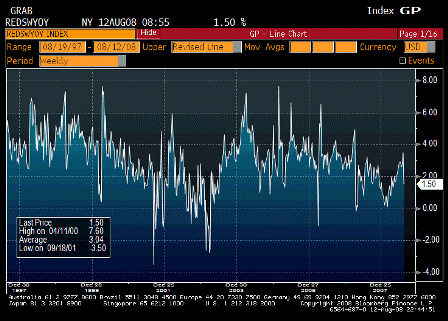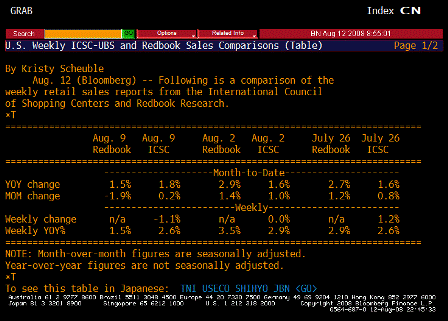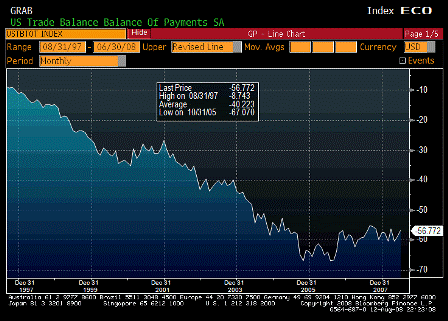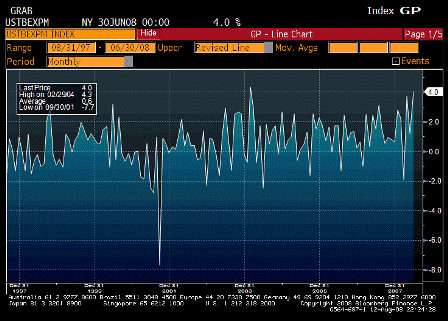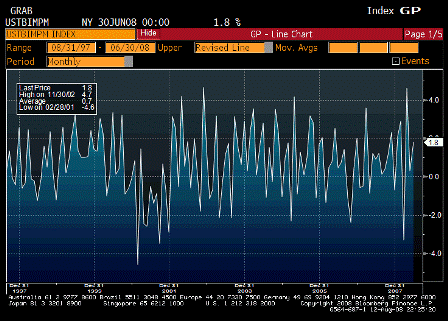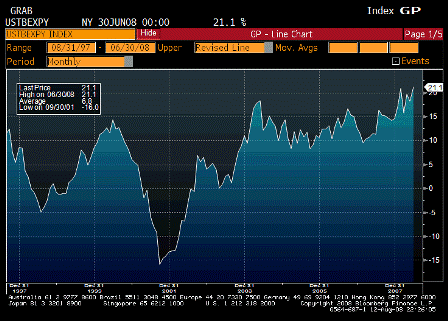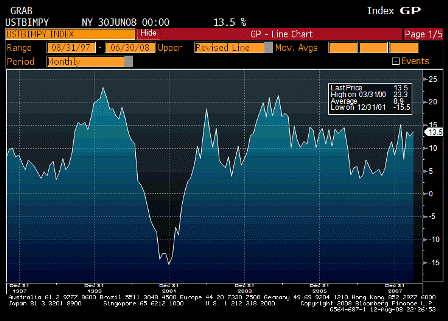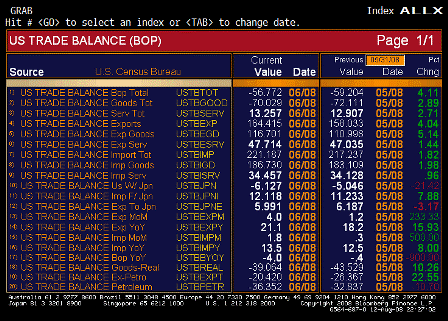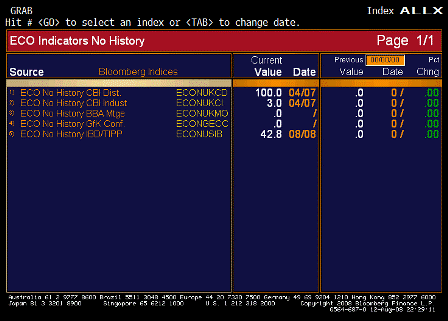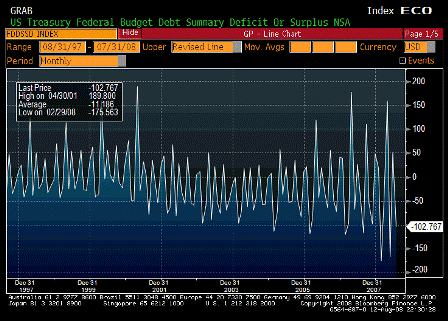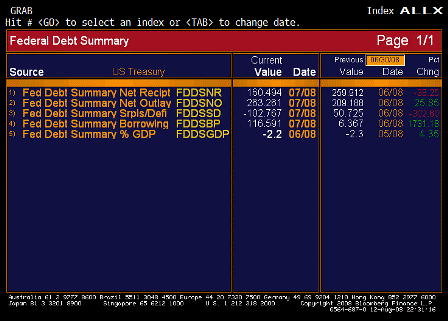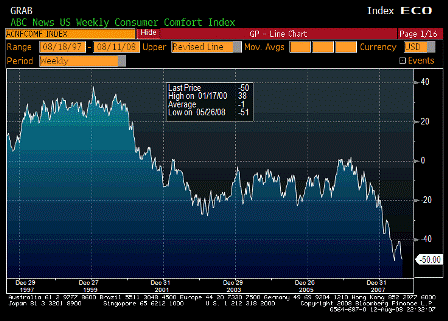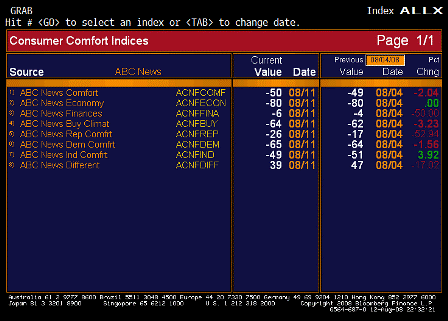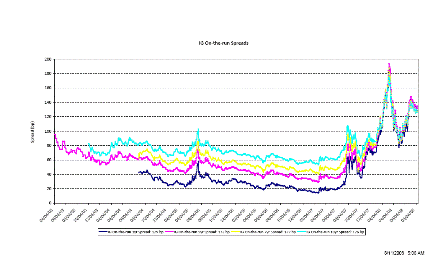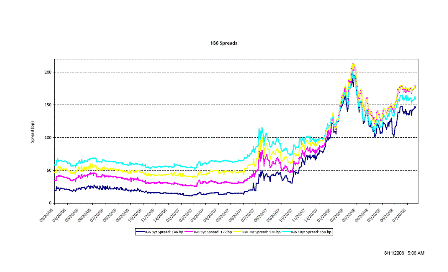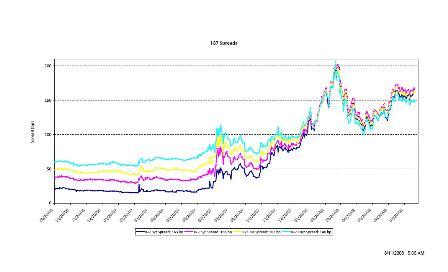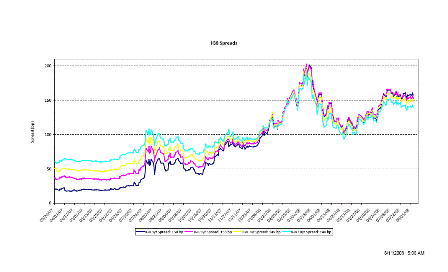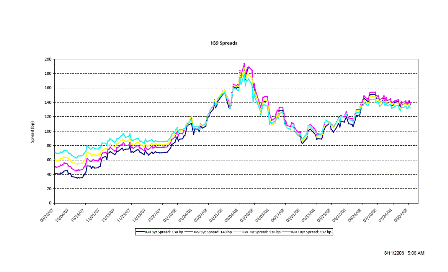[Skip to the end]
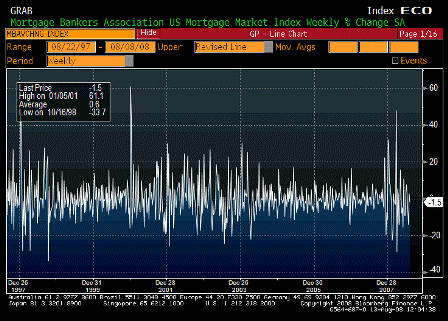


MBA Mortgage Applications (Aug 8)
| Survey |
n/a |
| Actual |
-1.5% |
| Prior |
2.8% |
| Revised |
n/a |
Muddling through on the low side as mortgage bankers lose market share to banks.
[top][end]
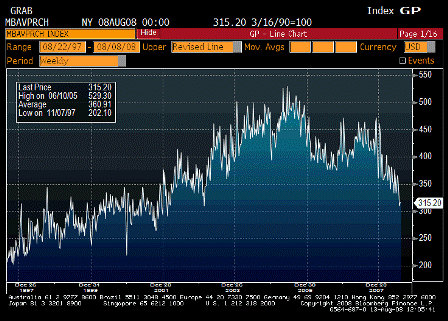


MBA Purchasing Index (Aug 8)
| Survey |
n/a |
| Actual |
315.2 |
| Prior |
315.2 |
| Revised |
n/a |
Flat at low levels.
May do better as the seasonal adjustments get easier.
[top][end]
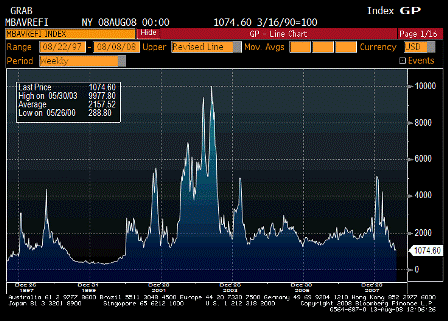


MBA Refinancing Index (Aug 8)
| Survey |
n/a |
| Actual |
1074.6 |
| Prior |
1121.8 |
| Revised |
n/a |
Slowing, as bulk of resets are past and rates are doing nothing.
[top][end]
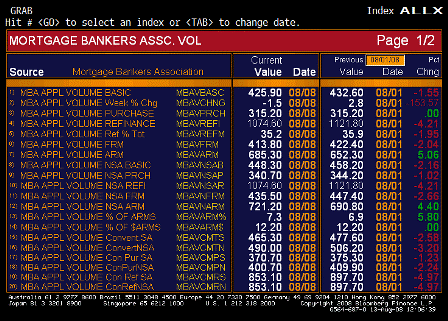


MBA ALLX 1 (Aug 8)
[top][end]
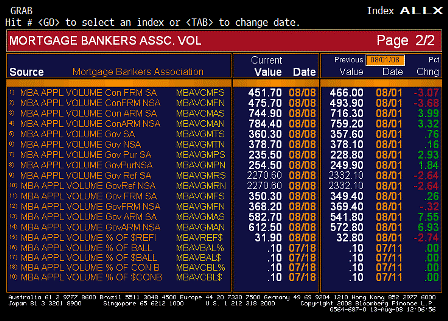


MBA ALLX 2 (Aug 8)
[top][end]
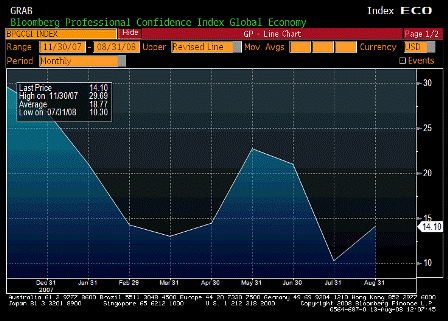

Bloomberg Global Confidence (Aug)
| Survey |
n/a |
| Actual |
14.10 |
| Prior |
10.30 |
| Revised |
n/a |
Low, but improving.
[top][end]
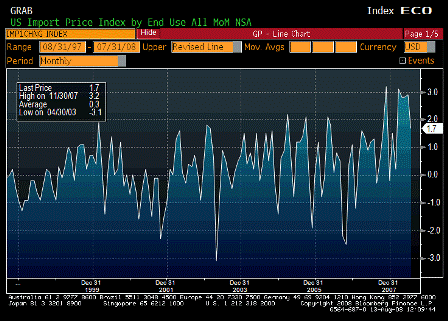


Import Price Index MoM (Jul)
| Survey |
1.0% |
| Actual |
1.7% |
| Prior |
2.6% |
| Revised |
2.9% |
Scary stuff if you are responsible for the value of the currency.
[top][end]
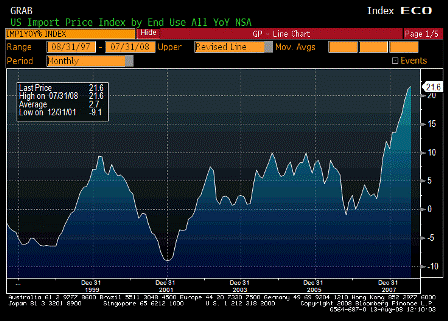


Import Price Index YoY (Jul)
| Survey |
20.4% |
| Actual |
21.6% |
| Prior |
20.5% |
| Revised |
21.1% |
‘Inflation’ flooding in through the open window.
[top][end]
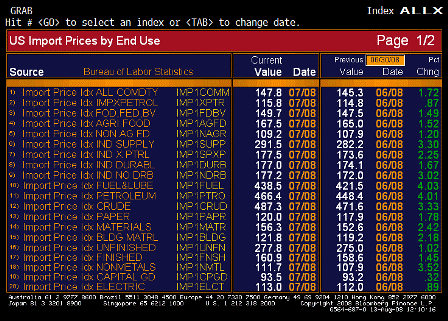


Import Price Index ALLX 1 (Jul)
[top][end]
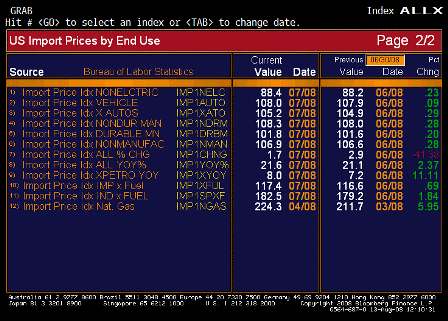


Import Price Index ALLX 2 (Jul)
Karim writes:
Import prices continue uptrend
- Headline +1.7% m/m; ex-petroleum up 0.9% m/m
Yes and ex petro 8% year over year and still rising. And this takes time to pass through to core CPI.
- Expect headline to be below core for the next few mths though
Yes, if gasoline stays down.
But rental vacancies took a small turn down, and owner equivalent rent already printed a 0.3%, and seems with starts so far down there has to be a shortage of actual units available to live in. Also, lots of catching up to do in other core measures, like medical and others which had some prints on the low side.
All of their costs are rising and push up prices with various lags.
And Russia has demonstrated they can do whatever they want and there’s nothing anyone can do about it.
Not good…
[top][end]
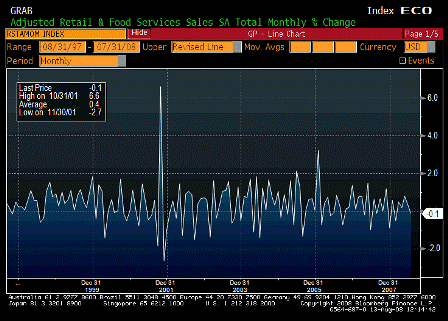


Advance Retail Sales MoM (Jul)
| Survey |
-0.1% |
| Actual |
-0.1% |
| Prior |
0.1% |
| Revised |
0.3% |
Down some as expected due to weak car sales, but prior month revised up.
Sometimes if people don’t buy cars they buy other things…
[top][end]
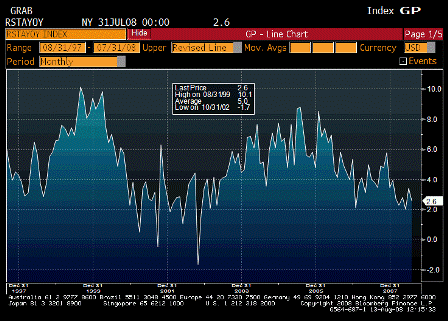


Advance Retail Sales YoY (Jul)
| Survey |
n/a |
| Actual |
2.6% |
| Prior |
3.4% |
| Revised |
n/a |
Still looks to be moving off a bottom.
[top][end]
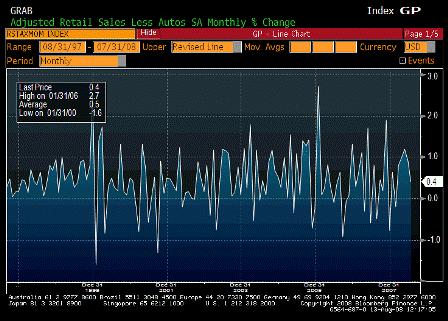


Retail Sales Less Autos MoM (Jul)
| Survey |
0.5% |
| Actual |
0.4% |
| Prior |
0.8% |
| Revised |
0.9% |
Looks okay, a tenth below expectations but prior month revised up the same tenth.
[top][end]
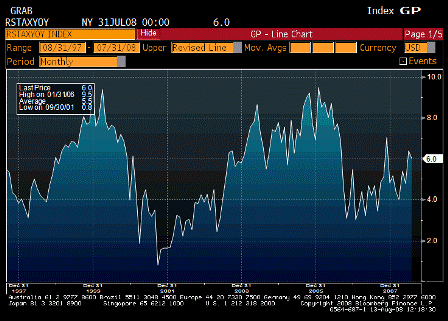


Retail Sales Less Autos YoY (Jul)
| Survey |
n/a |
| Actual |
6.0% |
| Prior |
6.4% |
| Revised |
n/a |
Looking reasonably firm.
[top][end]
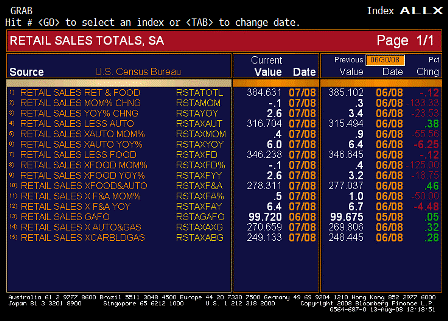


Advance Retail Sales ALLX (Jul)
On Wed, Aug 13, 2008 at 8:54 AM, Karim writes:
Retail sales generally weak but in line with expectations
- Headline -0.1% m/m; ex-gas -0.2% m/m; ex-autos +0.4%; control group +0.3%
- Rebate checks did trickle in through July so some help from there
- Looks like real PCE off to flat start in Q3, perhaps explaining Fisher’s remark yesterday that ‘we will broach zero growth’ in the second half of the year
The FOMC now has a multi year history of underestimating GDP and inflation.
Seems with Q2 GDP now looking like 3% or more, and the first half therefore averaging maybe over 2%, and year over year gdp still pushing 3%, they would either adjust or downgrade their GDP forecasting model.
Same with their inflation forecasting model, as cpi moves through 5% and core elevates from levels not long ago forecast at not a lot more than half that.
Looking more and more like the real economy did bottom in Q4 2007, as private forecasters are now starting to project positive gdp for Q3 and Q4, and some for Q1 2009 as well.
And even if the saudis keep crude at current levels core cpi should continue to march higher for many more quarters as it all catches up to the shift from $20 crude to $100+ crude.
Yes, the financial sector continues to have issues, may severe, but blood is flowing around the clot as the real economy moves forward.
Housing starts peaked in the early 1970s at 2.6 million with only 215 million people and no secondary market or housing agencies- just a bunch of dumb s and l’s taking in deposits and making mortgages (is used to work at one back then).
Today with 50% more people we call 2 million units gangbusters.
The financial innovation is all predatory at the macro level, though at the micro level we’d grown dependent on it for sure.
Yes, US exports are reducing foreign GDP growth, but their are signs they are moving to support domestic demand with fiscal measures, including Japan, the UK, and even some talk from the eurozone, and even china announced lower inflation numbers to justify supporting growth.
And Saudi crude output shows no sign of world net supply going up. Current price action just some kind of massive ‘inventory adjustment’.
Yes, that can change but hasn’t yet.
[top][end]
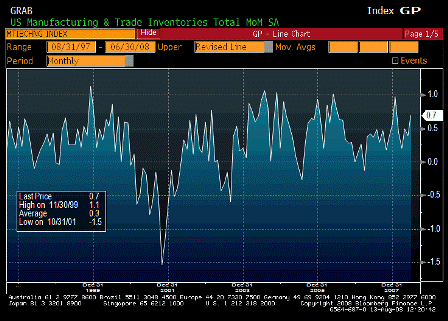


Business Inventories MoM (Jun)
| Survey |
0.5% |
| Actual |
0.7% |
| Prior |
0.3% |
| Revised |
0.4% |
3% Q2 GDP means more inventory is needed.
Also, this and previous inventory data for June higher than expected which means Q2 might be revised up that much more as very low inventory levels were estimated with the initial 1.9% release for Q2 GDP.
[top][end]
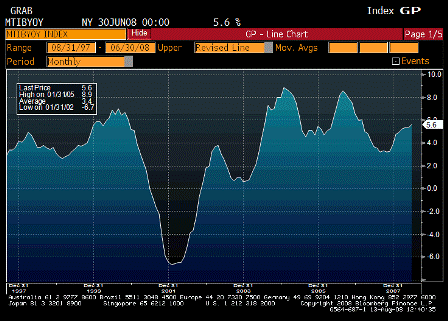


Business Inventories YoY (Jun)
| Survey |
n/a |
| Actual |
5.6% |
| Prior |
5.3% |
| Revised |
n/a |
Not the usual recession pattern.
The real sector seems well managed.
The financial sector is another story. They don’t count mbs inventory, for example, in this series…
[top][end]
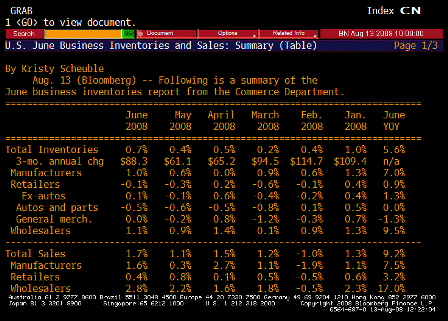


Business Inventories TABLE 1 (Jun)
[top][end]
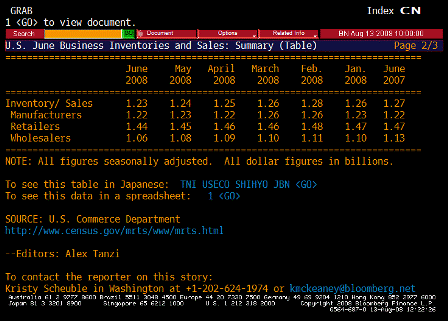


Business Inventories TABLE 2 (Jun)
[top]






















